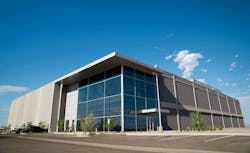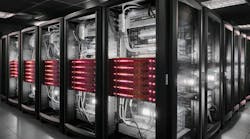EdgeCore Retools for Gigawatt-Sized Data Center Opportunities
A year after being acquired by Partners Group, EdgeCore Digital Infrastructure has retooled itself for the next phase of the data center boom. The company plans to build “gigawatt-sized data center regions” capable of providing high-density power to the world’s largest cloud and internet companies.
With a new motto of “Designed for Density,” EdgeCore will focus on creating larger campuses and a new data center layout optimized for high-density cooling to support AI workloads.
“The new EdgeCore is born in the age of AI,” said Lee Kestler, who joined the company as CEO in March. “We've just refocused the company. We're going to build the 300 MVA campuses or bigger, and we will expand into new markets.”
EdgeCore operates a data center campus in Mesa in the Phoenix market, and recently commenced construction on sites in Silicon Valley and Reno, Nevada as well as a new property in Loudoun County, Virginia. The company was founded in 2018 to build wholesale data center campuses in leading markets.
This week EdgeCore said it plans to invest $600 million in 2024 to create campuses in three new regions and is looking beyond the major markets that marked the first phase of EdgeCore’s journey.
“We believe AI is going to accelerate the opportunity in what used to be called secondary markets,” said Kestler.
Building out the EdgeCore Team
Kestler is familiar to many in the data center industry from his executive positions at DuPont Fabros Technology and Vantage Data Centers. Before building out EdgeCore’s footprint, Kestler set out to reinforce its team.
EdgeCore’s new hires include Chief Commercial Officer Clint Heiden and Executive VP Bob Berlinksy to oversee construction. Heiden held leadership roles at EdgeConneX and QTS Data Centers, while Berlinsky had key development roles at CloudHQ and DuPont Fabros. A new addition to the board is Heather Dooley, CEO of HDCM Management, who has held leadership posts on the Google and Microsoft data center teams.
“We've added some folks that really understand the business,” said Kestler.
EdgeCore has also updated its data center design, with buildings that start at 36 megawatts, divided across three data halls and at least two stories. The design can be expanded to support buildings from 72 to 144 megawatts, based on the campus and customer requirements. Importantly, EdgeCore will design its sites to support higher power densities, expecting customers to run at densities of 30 kW to 40 kW per rack.
“Since being acquired by Partners Group, we have retooled our data center designs and made the capital commitments necessary to provide the high-density power required by companies seeking to support artificial intelligence and machine learning (AI/ML) technology,” said Heiden. “This updated strategy will enable us to deliver our customers the certainty of execution they require in a trusted partner.”
Partners Group acquired EdgeCore in November 2022, investing $1.2 billion in the company and its development footprint. The capital infusion enabled EdgeCore to begin construction in Silicon Valley and Reno, and acquire a site in Northern Virginia.
“Partners Group is enthusiastic to lean in,” said Kestler. “We are moving with conviction.”
Targeting the AI Opportunity
The acquisition has brought new energy to EdgeCore, which had initially moved at a deliberate pace in a market where other new platforms have grown rapidly.
Partners Group sees huge opportunity in AI and its potential to boost demand for digital infrastructure. Prior to buying EdgeCore, it acquired atNorth, which operates nearly 100 MW of capacity in Iceland, all supported by renewable energy.
The firm’s bullish outlook on the data center sector was recently discussed by Fentress Boyse and Morgan Jones, both Investment Leaders in the infrastructure group at Partners.
“We have been tracking the data center sector through our thematic investing approach for some time and are now really starting to see an uptake in leasing activity from customers at our data center assets,” said Boyse. “While it is still early days for products and monetization, the infrastructure demand implications are dramatic. Ultimately, increased demand towards phase two of AI will create new opportunities for nimble players with experience navigating these dynamics at scale.”
“When we get to this second phase, or inference phase, where more AI applications have been built, we expect there will be a need for compute power closer to the actual source and consumption of data at the edge of networks,” said Jones. “We are seeing this play out through capital deployed and demand at the edge in anticipation of this phase. We are seeing unprecedented lease sizes from the hyperscalers at both dedicated core sites as well as edge facilities. It really is a landgrab right now.”
This vision of an expanded footprint for digital infrastructure aligns with growing power constraints in major markets. Kestler has long been focused on the intersection of data centers and renewable energy, an important expertise as the digital infrastructure sector focuses on sustainability.
With an eye on campuses of 300 MVA and beyond, Kestler says the best opportunities may lie in emerging markets.
“We're talking with Partners Group and our partners about renewable energy,” said Kestler, including new options for on-site power. “When we look at 2028 to 2030 we'll see better technology in that window.”
Partners views on-site power as a potential enabler of both sustainability and predictability in project delivery.
“In the near- to medium-term, data centers will remain connected to the grid to ensure uptime,” said Jones. “However, there is active dialogue and testing on how to leverage renewables and battery storage to not only provide a clean, redundant power source, but also faster time to market and less reliance on utilities with long lead times.”
“If we cast ahead five to 10 years, management teams will need to form a view about solutions such as small modular reactors and the associated power implications,” said Boyse. “These are large issues that the industry is grappling with because ESG has never been more important to our customers.”
Kestler says EdgeCore will also be mindful of how data center design and power decisions fit into the communities where they operate. With his long familiarity with the Northern Virginia market, Kestler understands the tensions around data center design and location.
“There's been so much that's been learned about aesthetics of data centers,” said Kestler. “The building will become softer in view, and you'll see more glass and vegetation where appropriate."
“We've also established a community engagement operation,” he added, noting the industry’s support of local schools and charities. “We're capable of making investments in the community, and we feel good about what we're doing.”
Keep pace with the fast-moving world of data centers and cloud computing by connecting with Data Center Frontier on LinkedIn, following us on X/Twitter and Facebook, and signing up for our weekly newsletters using the form below.
About the Author



